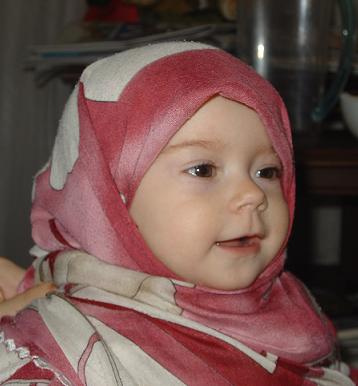 |
 ความคิดเห็นที่ 2
ความคิดเห็นที่ 2 |

ญุยูบิฮินนา
คำว่า "ญุยูบิฮินนา" (their bosoms) ที่กุรอ่านใช้ "ญุยูบ" เป็นพหูพจน์ของ "ญัยบ์" ซึ่งแปลว่า ซอง ซอก ร่อง(อก) รากศัพท์ของคำนี้หมายถึง Neck และ Collarbone (กระดูกไหปลาร้า) ด้วย ดังนั้นญัยบ์จึงกินความตั้งแต่ปลายคาง ลำคอ ช่วงไหล่ อกช่วงบน ลงมาถึงหน้าอกเลย
Shaykh Muhammad Nasiruddin Albani says that the word "jayb" is related to the word "jawb" which refers to something cut out, and he says that in this context it refers to the neckline of the woman's dress.
ในตัฟซีรฺ (Exegesis) ของกุรฺฏูบีบอกไว้ว่าสตรีในยุคก่อนอิสลามนั้น เขาจะคลุมผมโดยปัดชายผ้าไปด้านหลังเผยให้ช่วงลำคอและเนินอก อย่างที่ผมคัดมานี้
Imam Abu Abdullah Qurtubi: "Women in those days used to cover their heads with the khimar, throwing its ends upon their backs. This left the neck and the upper part of the chest bare, along with the ears, in the manner of the Christians. Then Allah commanded them to cover those parts with the khimar."
Imam Abu'l-Fida ibn Kathir: "'Draw their khumur to cover their bosoms' means that they should wear the khimar in such a way that they cover their chests so that they will be different from the women of the jahiliyyah (คือยุคมืดก่อนอิสลามมา) who did not do that but would pass in front of men with their chests uncovered and with their necks, forelocks, hair and earrings uncovered."
เพราะเหตุนี้พระองค์อัลลอฮฺจึงระบุว่า "...that they should draw their veils over their bosoms . . ." ให้มุสลิมะห์ปฏิบัติไว้ให้แตกต่างจากการปฏิบัติของหญิงอื่นๆ
หมายเหตุ: หากความว่า "over their bosoms" (อฺะลา ญุยูบิฮินนา) หมายถึง "on (above) their bosoms" แล้วล่ะก็ กรุอ่านก็จะใช้ว่า "เฟาเกาะ ญุยูบิฮินนา" มากกว่า ดังนั้น Over จึงเป็นคำแปลที่เหมาะสมแล้วของ "อฺะลา" เนื่องจากคำนี้ยังมีนัยยะของการข้าม พาด ผ่านจากที่หนึ่งไปยังอีกที่หนึ่งอยู่ด้วย ซึ่ง On หรือ Above ไม่มีนัยยะนี้ให้
| จากคุณ |
:
Carroth  
|
| เขียนเมื่อ |
:
19 ต.ค. 52 20:41:39
|
|
|
|
 |



